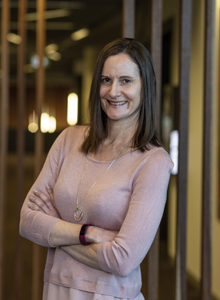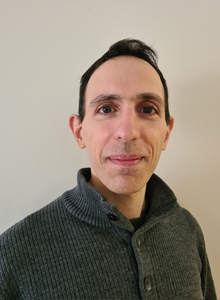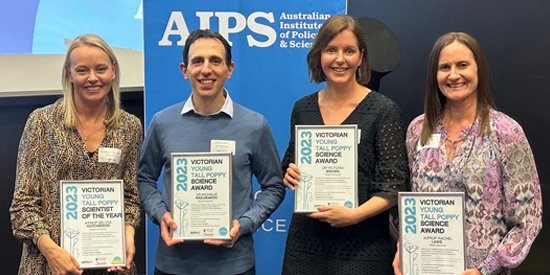Rising above: Deakin's latest Young Tall Poppies make their mark
Research news
Four Deakin University early career researchers have been recognised in the 2023 Victorian Young Tall Poppy Science Awards for their innovative work in health economics, food systems sustainability, early childhood nutrition, and mental health and substance use problems.
The annual Tall Poppy awards are run by the Australian Institute of Policy and Science (AIPS) to honour up-and-coming scientists who combine world-class research with a passionate commitment to communicating science. Recipients are tasked with promoting interest in science among students in all stages of learning, teachers and peers. They also provide understanding and an appreciation of science in the broader community.
Deakin’s Associate Professor Delyse Hutchinson, Associate Professor Rachel Laws, Dr Vicki Brown and Dr Michalis Hadjikakou were recognised at the official Victorian Tall Poppies Awards Ceremony this week.
Associate Professor Hutchinson was also named Victorian Tall Poppy of the Year – marking the third year in a row a Deakin recipient has been honoured with the title.
Introducing our 2023 Victorian Tall Poppy of the Year…
Associate Professor Delyse Hutchinson, The Centre for Social and Early Emotional Development (SEED)

Assoc. Prof. Hutchinson works to understand the developmental origins of mental and behavioural disorders. She has worked as a Clinical Psychologist specialising in pregnancy, postnatal adjustment, child development, and the treatment of mental health and behavioural disorders. She’s particularly interested in understanding the causes and consequences of alcohol and other substance use exposure on development.
‘Mental health and substance use problems are common in the community and can have significant negative impacts on people's health and wellbeing, including physical health problems, poorer educational and employment opportunities, and social and relational difficulties,’ she says.
‘When mental and substance use problems continue into parenthood, they also have adverse impacts on children and young people’s health and wellbeing, resulting in an intergenerational cycle of mental disorder that is difficult to shift.
‘My research seeks to improve our understanding of intergenerational patterns of mental health and substance use problems from one generation to the next, using data from long-running studies that have assessed families over multiple generations. I also aim to identify critical risk and protective factors that can be targeted across development to inform prevention and intervention approaches on how to break the intergenerational cycle of mental disorder.’
Assoc. Prof. Hutchinson is listed in the top 1% of influential researchers world-wide on alcohol disorders. She holds a competitive NHMRC Investigator Grant ($1.6 million), leading an innovative program on the impacts of mental health and substance use problems on children. Her research has had significant impact, informing national and international policies for the prevention of mental and substance use disorders. She has a passion for community engagement and science communication, having been actively involved in public media over her career, and has held numerous leadership positions developing national health guidelines and informing practitioners and policy makers on the best investments for prevention of mental disorders.
…and our 2023 Victorian Tall Poppies
Associate Professor Rachel Laws, Institute for Physical Activity and Nutrition (IPAN)

Assoc. Prof. Laws’ world leading research focuses on nutrition in the first 2000 days of life, from pregnancy to age five years and examines how best to scale up and integrate effective early life nutrition interventions into policy and practice. She leads the Institute for Physical Activity and Nutrition’s (IPAN) INFANT program, which is designed to help parents and families with healthy eating and active play from the start of their baby’s life. The program includes group sessions for parents in the first year of their child’s life and an app called My Baby Now.
‘My work is all about working out how we can help parents and their children to eat a diet that will promote health across life,’ she says.
‘Good nutrition, right from the start of life, is vital for healthy child growth and development, including their physical health, mental health and how well they do at school. Common conditions like obesity, and, later in life, heart disease, diabetes and some cancers are all related to what we eat. We know that food habits learnt in childhood influence how people eat as adults, so learning to eat well as a young child is vital in optimising wellbeing.
‘To help effectively translate my research, I work closely with end users including practice and policy stakeholders to ensure interventions are scalable for delivery in routine practice.’
Assoc. Prof. Laws has attracted over $17.1 million in competitive collaborative funding as chief investigator and published more than 100 papers (55 as lead or senior author). Her community outreach includes presentations to over 2000 maternal and child health nurses and to the
Victorian Healthy Eating Enterprise reaching 400 practice and policy stakeholders from more than 40 public health organisations.
Dr Vicki Brown, Senior Research Fellow at the Institute for Health Transformation’s Deakin Health Economics (DHE) and member of the Institute’s Global Centre for Preventive Health and Nutrition (GLOBE)

Dr Brown is one of very few health economists worldwide providing evidence to decision-makers and government on which obesity prevention interventions are most cost-effective.
‘Especially after the COVID-19 pandemic, there are limited health resources to share around and it’s critical that decision-makers prioritise interventions that are the best value for money,’ Dr Brown says.
‘To do this, they need evidence of which interventions deliver the best return on investment. My research shows which interventions best improve population health, and how much they might cost. It also estimates the future benefits of keeping people healthy, such as the future healthcare cost-savings from keeping people out of hospital. The evidence I generate aims to provide decision-makers with the information needed, so that each dollar spent on prevention delivers the best ‘bang for buck’ to improve population health.’
Dr Brown has published 41 articles in high-quality journals and been awarded more than $6.8 million in competitive research funding. She leads the health economics streams of three NHMRC grants at Deakin, including as a Chief Investigator on the Centre of Research Excellence for Translating the Early Prevention of Obesity and conducts the economic evaluation of Deakin’s INFANT program.
Her work has been referenced in policy documents worldwide, including in publications by the Australian Institute of Health and Welfare, the World Health Organization (WHO) and the World Bank. She also led a submission to the Senate Select Committee into the obesity epidemic and discussed the economic evidence at the Senate hearings. Her research was also referenced in Australia’s National Obesity Strategy 2022-32.
Dr Michalis Hadjikakou, Senior Lecturer in Environmental Science and Sustainability, School of Life and Environmental Sciences

Dr Hadjikakou has made a substantial contribution to the fields of sustainability science, in particular water resources management and food systems. He has developed software which is actively used in the water industry to compare alternative water supply options and is nationally and internationally regarded as an authority on food systems modelling and scenario analysis.
‘The world is facing pressing environmental challenges that threaten the stability of our societies and our long-term well-being. At the heart of these challenges is the way we currently produce, trade and consume goods and services – including food,’ Dr Hadjikakou says.
‘My research directly contributes to the urgent quest for an environmentally sustainable food system by quantifying the “environmental footprint” of current and future diets and food production methods, enabling comparisons of potential emerging solutions such as plant-based proteins and regenerative farming methods.
‘Through my research I can answer important questions such as “which diet is best for health and the environment in different geographic locations?”’
Dr Hadjikakou has co-authored over 60 articles in high-quality sustainability journals and has secured $4.3 million of research income as lead or joint chief investigator. Notable ongoing contributions include his involvement in the $1.2 million Land Use Futures project, where he is developing an innovative model of demand for Australian agricultural production given changes in both domestic and global settings. He also helped to secure and is leading a theme in the ‘Healthy Food, Healthy Planet, Healthy People’ NHMRC Centre for Research Excellence on the environmental impact of food and beverage products.
His work and expert opinions have been featured on ABC News, The Guardian, The Age, and Crikey and various radio stations. He also serves as an expert for the Australian Associated Press fact check service and sits on the Environment Advisory Committee for Yarra City Council since July 2022.
Want to make a difference like our 2023 Tall Poppies? Get it done at Deakin.
With a PhD from Australia's most progressive research university, you'll develop the expertise needed to drive change in your field. At Deakin, we focus on developing your practical research skills and connecting you to global research networks, so you’re ready and able to break new ground.
The text of this article is licensed under the Creative Commons Attribution (CC BY) 4.0 International license. We'd love for you to share it, so feel free! Please note that images, videos, graphics and logos are not covered by the CC BY license and may not be used without permission from Deakin University or their respective copyright holder. If you have any questions please contact researchcomms@deakin.edu.au.
Thanks for reading! You can find more stories like this at www.deakin.edu.au/research/research-news-and-publications. We ask that Deakin University and individuals are appropriately credited and that you include links back to this website. Quotes in this article can be extracted for other articles provided individuals are appropriately credited and you include a link back to the article URL.
Share this story

Key Fact
2023 Victorian Tall Poppy of the Year Assoc. Prof. Delyse Hutchinson, and her fellow Deakin Tall Poppies Dr Michalis Hadjikakou, Dr Vicki Brown and Assoc. Prof. Rachel Laws
